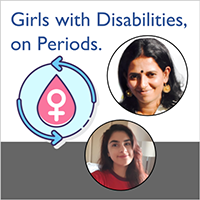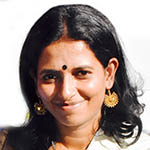Girls with Disabilities, on Periods.

![]() By Dr.Shubha Nagesh, an Atlantic Fellow for Global Health Equity, and Muskaan Vohra, student at Monash University.
By Dr.Shubha Nagesh, an Atlantic Fellow for Global Health Equity, and Muskaan Vohra, student at Monash University.
The World Economic Forum (WEF) highlights three main barriers preventing girls and women from accessing proper menstrual hygiene, including lack of awareness, acceptance, and access to hygiene products. Menstruation is natural, but the onset of menarche may pose serious health complications for young girls due to stress and stigma. Shame, social taboos, and superstitions often deny many young women the physical and mental wellbeing during this important stage in their development.
In India, these barriers are ever-present with 71% of girls being inadequately informed about menstruation until they attain menarche and 88% not utilising sanitary napkins, instead using homemade alternatives which include old cloths, hay and even sand. Women are subject to rigid social norms, harmful traditional practices, and movement-restricting taboos at multiple levels. To overcome these barriers, the WEF outlined solutions for government, private sector, and non-government organizations.
Emerging research suggests that the menstrual health of women with developmental disabilities is in particular often ignored. Environmental factors often cause these young women to disproportionately face additional challenges, including difficulty in communicating the onset and pain of menstruation or physically being unable to change and/or apply sanitary napkins, without the aid of a parent and/or caregiver. Due to their sheer dependency, the attitudes and practices of the parents and/caregivers is pivotal in understanding how women with disabilities experience menstruation.
The stigma of disabilities in India coupled with social norms around menstruation creates a challenging context. To understand better a small scale exploratory assessment was conducted in Dehradun, India to report challenges faced by the girls and their parents and/caregivers.
Through semi-structured interviews, participants were asked about their understanding of menstruation, their experiences with menarche, perceptions and attitudes over time in relation to menstruation and/or disabilities. Parents and/caregivers were also asked to share the impact disability has had on their daughter’s menstruation and the support that was needed.
The girls were aware of menstruation but were unable to anticipate their cycle every month. All participants were aware of what menstruation entailed but were not knowledgeable about why it occurred. Some girls associated it with the word “bad” with others explaining menstruation as “bad things going out.” The majority of participant feelings associated with menstruation and menarche included fear, anger, and “feeling dirty.” Furthermore, some girls explained limits in mobility including being unable to enter their home, temple, or even the kitchen. When asked about menstrual protocol, the girls were aware of the steps in wearing and disposing sanitary napkins, but one expressed her concern over disposing it in the trash as others, including the garbage collector, would know about her period. This challenge reinforced other assessment findings that menstruation was associated with shame, even in the eyes of youth.
Similar to the girls, most care-givers exhibited limited knowledge about the reason for menstruation referring to menstrual blood as “impure.” The majority of care-givers stated that due to societal norms, they were given no information prior to menarche “in the village parents do not discuss things with their children. We never told our mother what happened with us, how we dealt with it, nor did we ask anyone for advice.” This cycle was seen to perpetuate as many care-givers mentioned that they themselves did not see the point in informing their child, either because they perceived the child to be too young (and thus admitting they do not know when to inform) or because they doubted their child’s ability to understand. When asked about autonomy (i.e. the girl’s ability to wear and change her sanitary pads) a care-giver replied, “We never tried, we just put it on her.” Half of the care-givers interviewed mentioned higher levels of restrictions in the past and their in-law’s house with two carers stating that the only restriction they invoke is one of the family temple. The challenge of combating irregular cycles due to a lack of information of typical and atypical menstruation also arose.
While the scope of the study was very limited, the findings suggest that identification of healthy menstruation and the anticipation of menstrual onset as two big challenges faced by young girls with disabilities. The intervention sessions that incorporated sessions on menstrual health and hygiene were greatly appreciated and valued by girls and their parents and/or caregivers. This study brought forth four lessons:
- Early Intervention through orientation to menstrual health to occur at an early age.
- Standardised, generic awareness sessions should be supplemented with specific advice based on the severity of the disability.
- Parent/caregiver involvement in sessions will support creation of a menstrual routine, well in advance, so stress can be avoided.
- Training for young girls to keep track of their menstrual dates could also be done through innovative, local, context-specific strategies.
As per the WEF article, non-profit organizations play an important role in breaking barriers and providing awareness, knowledge and the power of agency, to those who need it the most. We couldn’t agree more! Government subsidies on menstrual products would be welcome. More focused efforts to reduce stigma around this topic particularly in peri urban and rural contexts would deeply improve access to factual information and promote safe practices reducing morbidity around menstrual health.
Acknowledgement: Latika Roy Foundation, Dehradun, Uttarakhand, India
ABOUT THE AUTHORS
 Dr.Shubha Nagesh is a medical doctor by training and specialized in Global Health from Karolinska Institute as an Erasmus Mundus Scholar. An Atlantic Fellow for Global Health Equity, she works for children with developmental disabilities in the foothills of the Indian Himalayas, and is striving to make childhood disability a global health priority. She is the South-Asia correspondent for International Health Policies.
Dr.Shubha Nagesh is a medical doctor by training and specialized in Global Health from Karolinska Institute as an Erasmus Mundus Scholar. An Atlantic Fellow for Global Health Equity, she works for children with developmental disabilities in the foothills of the Indian Himalayas, and is striving to make childhood disability a global health priority. She is the South-Asia correspondent for International Health Policies.

Muskaan Vohra is a student at Monash University and is currently pursuing a Bachelor of Science in Global Studies with a concentration in International Relations.




Responses